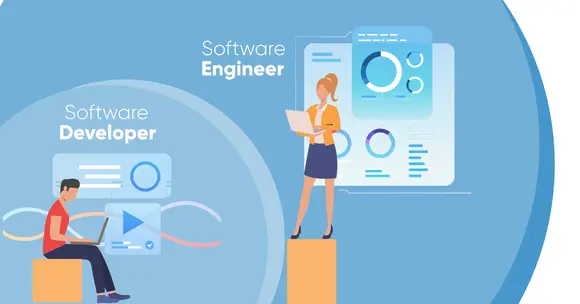Software development is a dynamic and rapidly evolving field that plays a crucial role in the functioning of modern technology. According to the U.S. Bureau of Labor Statistics (BLS), software developers create the computer applications and systems that perform specific tasks and control networks. Their work ranges from developing gaming apps to creating tax preparation software and medical patient web portals. This guide will take you through the essential steps to becoming a successful software developer.
What Does a Software Developer Do?

Software developers are responsible for designing, coding, testing, and maintaining software programs. They analyze user needs and create software solutions to meet those needs. This involves writing code, debugging, and ensuring that the software functions correctly. Software developers work in various industries, creating applications and systems for different purposes, including business, healthcare, finance, and entertainment.
Software Developer vs Software Engineer

The roles of software developers and software engineers often overlap, but there are distinct differences. Software developers focus on specific projects or user needs, working directly with code and software applications. They are more hands-on and detail-oriented, typically working under the direction of software engineers who take a broader, strategic approach to software development. Engineers develop and implement solutions that address the overall needs of the business.
Web developer vs software developer

While both web developers and software developers create and maintain computer applications, their focus areas differ. Web developers specialize in building and maintaining websites, ensuring performance, capacity, and content creation. In contrast, software developers create applications and systems that control devices and networks, such as smartphones and embedded systems.
Steps to Become a Software Developer
Step 1: Enhance Your Software Development Skills
To excel as a software developer, you need a blend of technical and soft skills. Technical skills include proficiency in programming languages, an understanding of software development principles, and the ability to write and debug code. Soft skills, such as effective communication, problem-solving, and time management, are equally important for collaborating with team members and stakeholders.
Technical Skills
- Programming languages: Python, Java, HTML, CSS, JavaScript, etc.
- Programming patterns
- Text editors: Notepad++, Brackets, etc.
- Cloud computing: AWS, Microsoft Azure, Google Cloud Platform, etc.
- Application program interfaces (APIs)
- Container orchestration tools: Docker, Kubernetes, Istio, etc.
- Data warehouses: Kafka, Snowflake, etc.
- Machine learning tools: TensorFlow, PyTorch, etc.
Transferable Skills
- Analysis
- Mathematics
- Communication
- Creativity
- Problem-solving
- Time management
- Adaptability
- Attention to detail
Building proficiency in these skills can help you stand out from other candidates and prepare you for the challenges of software development.
Step 2: Pursue a Software Developer Degree or Course
Educational qualifications play a significant role in becoming a software developer. Most software developers hold a bachelor's degree in computer science, information technology, or a related field. These programs provide a solid foundation for software development principles and practices.
For those looking to specialize, pursuing a master's degree or enrolling in focused courses such as web development or mobile development can be beneficial. The technology field is constantly evolving, so staying updated with new tools and programming languages through continuous learning is crucial. Platforms like edX offer various software development courses that cater to different levels of expertise and career goals.
Step 3: Obtain Software Developer Certifications
Certifications are a valuable way to showcase your skills and knowledge to potential employers. While not always mandatory, certifications can demonstrate your expertise in specific areas. For example, certifications in cloud computing (AWS, Google Cloud, and Microsoft Azure) or project management can enhance your job prospects. Choose certifications that align with your career goals and the technologies you are interested in.
Step 4: Meet Software Developer Requirements
Different employers have varying criteria for software developer roles. Some may require a bachelor's or master's degree, while others might prioritize hands-on experience and specific certifications. Understanding the specific requirements of potential employers can help you tailor your education and experience to meet their expectations.
For instance, if an organization uses Google Cloud technology, they may prefer candidates with Google Professional Cloud certification. Similarly, companies using Adobe, AWS, Microsoft, or Oracle systems might look for candidates with relevant certifications. Additionally, managerial roles may require certifications in project and team management.
Step 5: Start Your Software Development Career
The demand for software developers is high, with the BLS projecting faster-than-average growth in this field. This growth is driven by the increasing need for automation, artificial intelligence, Internet of Things (IoT) devices, and cybersecurity solutions. Key industries for software developers include computer systems design, finance, software publishing, and manufacturing.
When you are ready to start your career, follow these steps to maximize your chances of success:
- Determine Your Career Goals: Identify the type of software development role you are interested in and target relevant job opportunities.
- Tailor Your Resume: Highlight your technical skills, relevant experience, and projects. Emphasize your proficiency in programming languages, frameworks, and tools.
- Establish an Online Presence: Use platforms like LinkedIn to demonstrate your expertise, showcase your project portfolio, and network with professionals in your field.
- Research potential employers: Look for companies that align with your interests and values. Familiarize yourself with their products, services, culture, and recent developments.
- Prepare for Interviews: Study common interview topics and practice coding problems. Review technologies relevant to the role and think about how you can showcase your problem-solving, communication, and teamwork skills.
- Apply Strategically: Use your network, job boards, and recruitment platforms to find suitable openings. Customize your application for each job, emphasizing how your skills and experience match the specific requirements.
Conclusion
Becoming a software developer is a rewarding career path that offers numerous opportunities for growth and innovation. By enhancing your technical and soft skills, pursuing relevant education and certifications, and strategically navigating the job market, you can position yourself for success in this dynamic field. Whether you are just starting or looking to advance your career, continuous learning and adaptation are key to staying ahead in the ever-evolving world of software development.

